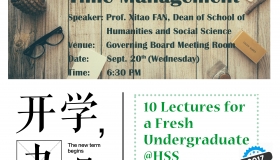【Academic Seminar】Learning and Optimization for Emerging Social Network Applications - Dr. Zhen Jason XU
Topic: Learning and Optimization for Emerging Social Network Applications
Speaker: Dr. Zhen Jason Xu, Columbia University
Time and Date: 14:00 - 15:00 , Thursday, November 28, 2019
Venue: Boardroom, Dao Yuan Building
Abstract:
Social networks have in recent years greatly reshaped the ways in which people interact and collaborate, as well as the way in which information spreads. For instance, new marketing forms like influencer marketing are prevailing in popular network sites such as Facebook, Twitter, and Instagram, where brands leverage the massive followings of influential social network users to spread product information and target potential customers. We consider a brand with a given budget that wants to promote a product over multiple rounds of influencer marketing. In each round, it commissions an influencer to promote the product over a social network, and then observes the subsequent diffusion of the product before adaptively choosing the next influencer to commission. This process terminates when the budget is exhausted. We assume that the diffusion process follows the popular Independent Cascade model. We also consider an online learning setting, where the brand initially does not know the diffusion parameters associated with the model, and has to gradually learn the parameters over time.
Unlike in existing models, the rounds in our model are correlated through an intermediary constraint: each user can be commissioned for an unlimited number of times. However, each user will spread influence without commission at most once. Due to this added constraint, the order in which the influencers are chosen can change the influence spread, making obsolete existing analysis techniques that based on the notion of adaptive submodularity. We devise a sample path analysis to prove that a greedy policy that knows the diffusion parameters achieves at least 1-1/e-\epsilon times the expected reward of the optimal policy. In the online-learning setting, we are the first to consider a truly adaptive decision making framework, rather than assuming independent epochs, and adaptivity only within epochs. Under mild assumptions, we derive a regret bound for our algorithm. In our numerical experiments, we simulate information diffusions on four Twitter sub-networks, and compare our UCB-based learning algorithms with several baseline adaptive seeding strategies. Our learning algorithm consistently outperforms the baselines and achieves rewards close to the greedy policy that knows the true diffusion parameters. The talk will also discuss some extensions and variants in influence spread markets.
Biography:

Dr. Zhen Jason XU is now a postdoctoral researcher at Department of IEOR, Columbia University. His research interests lie at the interface of operations research, applied probability, and machine learning, with a focus on stochastic process control, supply chain management and data-driven decision making for a variety of static and dynamic models.. Dr. XU received Bachelor degree from Department of Mathematical Science, Peking University and Ph.D. degree from Department of IELM, HKUST. So far, he has published papers in journals like Management Science, Mathematics of Operations Research, etc.




